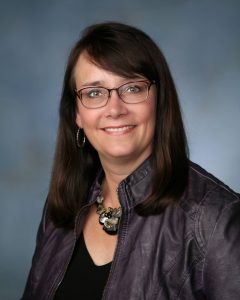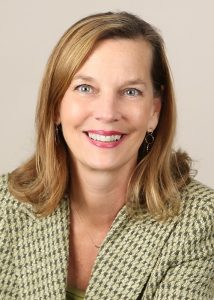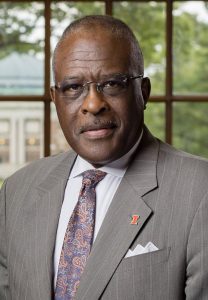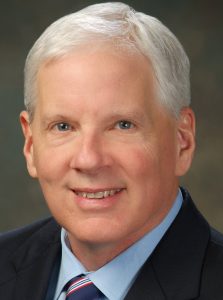The College of Agriculture, Food and Natural Resources has honored the 2020 recipients of the CAFNR Column Award for Distinguished Alumni. Although the recognition process looks different for this year, CAFNR’s outstanding alumni were still celebrated for their notable accomplishments.
The Column Awards are the highest honor given by the College to recognize outstanding achievements of its accomplished alumni. The awardees represent graduates from each of CAFNR’s six divisions, reflecting the six historic columns at the University of Missouri.

Animal Sciences
Eldon Cole // MS Animal Husbandry ’63, BS Agriculture ’62
Eldon Cole has been a long-time presence in southwest Missouri, serving the surrounding communities’ livestock producers. He began his Extension journey in 1964 in Saline County as a balanced farming agent. Eldon went on to serve Lawrence and Greene counties as the livestock agent for 12 years before furthering his career, taking on the position of Southwest Region Livestock Specialist. In 1996, he added a new responsibility, simultaneously serving as the Lawrence County Program Director and has successfully navigated the dual roles ever since.
1996 proved to be a pivotal year in Eldon’s career. The Show-Me-Select Replacement Heifer Program began as a pilot in northeast and southwest Missouri – his service area. Show-Me-Select focuses on enhancing the adoption of reproduction and genetic technologies across the state of Missouri. Eldon has been a pioneering force with this program since its beginning.
His service to both agriculture and Missourians spans nearly five decades. In his nomination letter, Bill Lamberson, director of the Division of Animal Sciences says, “During this time, and over the course of his distinguished career, Eldon continues to leave an indelible mark on Missouri’s livestock industry by his creation of an educational conduit to transfer improvements in technology to the field. His ability to translate advances in scientific research to the production sector in his region led to improvements in producers’ bottom lines and the Missouri agricultural economy as a whole.”
Eldon has received numerous awards over the years, including Livestock Person of the year, from University of Missouri Block & Bridle, the Citation of Merit from the CAFNR Alumni Association and Missouri Farm Bureau Agriculturalist of the Year.
“What is perhaps most noteworthy however, in considering the impact Eldon has had, is the fact that he continues to keep pace with advancements in science and production practices that meaningfully impact the production sector,” says David Patterson, Chancellor’s Professor in Animal Sciences.
“His contributions to Missouri agriculture have not gone unnoticed by other states.”
As stories are shared, the common thread is the same: Eldon Cole brings cutting-edge information to the field, year after year. The avenues in which he does this are far-reaching and diverse, from a beef newsletter to weekly radio reports in both Missouri and Kansas, as well as livestock news releases in national publications like Drovers Journal. After more than 50 years, Eldon continues to serve as a mentor to his peers and livestock industry professionals.

Applied Social Sciences
Charlene Finck // BS Agricultural Journalism ’85
Charlene Finck is a pioneer in the agricultural journalism sector, serving as the president of Farm Journal – the first female president in Farm Journal’s 143-year history. Though she is newly-established in the president’s role, Finck is no stranger to Farm Journal, previously serving several roles within the company, beginning as assistant editor in 1985 and working her way to division president of producer media before being named to her current position in April 2020.
One of her most remarkable accomplishments is establishing the Farm Journal Test Plots in 1991, and 29 years later, they remain the independent “Consumer Reports” of production practices in agriculture. Thousands of acres across five states span the field-testing program that create independent results that help farmers maximize production, profitability and sustainability.
“I have known Charlene since she was an intern at Successful Farming magazine, in the early 1980s, where I was an editor. I have watched her amazing and stellar career with pride, to see another woman who was truly one of a handful of women making inroads into the agricultural press at the time,” says Danita Wood, owner and editorial director of Missouri Life magazine.
“Charlene thrived at all of the challenges she faced at Successful Farming as a young editor.”
In his nomination letter, Joe Parcell, director of the Division of Applied Social Sciences, notes that Charlene brings ongoing leadership to Farm Journal every day. “Her skills in seeing the big picture and taking the long view in agriculture, coupled with the drive and then the ability to marshal resources to actually make it happen are the right ingredients to propel Farm Journal to future growth.”
Charlene serves as Charter Board Member for Missouri Association of Publications, as well as a member for the University of Missouri Ag Journalism Alumni Advisory Committee.
“Charlene has not only excelled on the publication side but has given back to the industry and communities where she lives. She has served on both the Farm Foundation and National FFA Trustee Boards. And she continues to lead Farm Journal’s Foundation Board as its president since it was conceived back in 2010,” writes Lyle Orwig, chairman and founding partner of Charleston|Orwig.

Biochemistry
Sharon Berberich // Biochemistry ’82
Sharon Berberich is an industry leader in product and business development with an extensive background in food and agriculture. Her most recent position was serving as CEO of Plastomics Inc., a plant biotechnology company focused on bettering crops through the use of chloroplast engineering.
Sharon is one of a class of only 15 individuals who were awarded the first biochemistry degrees from the College of Agriculture, Food and Natural Resources (CAFNR), which came after a merger between CAFNR and the School of Medicine. She credits her academics with giving her the experience she needed to join Monsanto as a research scientist, which launched a 30-plus-year career in the ag biotechnology field.
“While Sharon was an advisee of mine, she did not need much advising. She was focused, knew what she needed to do and always was able to maximize her learning,” says Doug Randall, professor emeritus of Biochemistry.
“Her most impressive characteristic is her willingness to do the deep dive into learning all she can about what needs to be done and known about a venture. Sharon Berberich has combined exquisite people skills, analytical skills and adventurism to beyond worthy of recognition.”
At Monsanto, she held a number of positions, including those in research and development, regulatory affairs, licensing, field operations and other crop-focused sectors.
She later held positions as Director of International Programs and Assistant Director of Technology Management at the Donald Danforth Plant Science Center. Then, she joined the team at Dow AgroSciences to establish an agronomic traits pipeline, leading out-licensing efforts for EXZACT™ Precision Technology. Sharon was instrumental in developing a dedicated licensing function for Dow and led transactions across the business, including biotechnology efforts.
“We take for granted that life sciences disciplines have good gender representation today, but there was a time when that was not true. So, I am excited to acknowledge a woman who could be considered a pioneering student in our program,” says Jack Tanner, professor of Biochemistry.
Today, through her own company, Saber Consulting, Sharon continues to work with start-up companies in food and agriculture, assisting them in various capacities such as mentor, board member, business developer, regulatory advisor, fractional CEO and/or COO.

Food Systems & Bioengineering
Sarah Geisert // BS Food Science ’81
Sarah Geisert is a recognized global leader for international food safety. For more than three decades, she was employed at General Mills, rising from research and development as her first position within the company, moving through various marketing and supply chain positions to director, then to senior director, a position she held for 11 years. There, she led the corporate team, protecting and growing General Mills’ global business position, while providing expertise in regulatory risk management, biotechnology strategy and other food safety issues.
Geisert is now a self-employed consultant, sharing her same strengths and industry experiences that moved General Mills forward to help companies with issues pertaining to food safety and risk management. In this role, she also actively seeks community partnerships aimed to end hunger around the globe.
In 2017, Sarah returned to campus, serving as CAFNR’s Executive-in-Residence. Jinglu Tan, director of the Division of Food Systems and Bioengineering said “she was an outstanding role model for our students.”
Tan, in his nomination letter says, “She provided industry leadership in the Food Safety Modernization Act (FSMA) and worked closely with FDA’s leadership. Sarah has been involved in numerous food safety and regulatory organizations and activities internationally in Singapore, China, Korea, Brazil, India, Canada and other countries.”
“Sarah has rich experience in global regulatory, food safety, risk and incident management and brand protection. Sarah was a recognized global leader for a Fortune 100 company’s International Food Safety and Regulatory Strategy and Compliance Programs for many years,” says Mengshi Lin, professor of food science.
“She is an innovator seeking ways to connect and collaborate to efficiently advance food safety and regulatory solutions worldwide.”

Plant Sciences
Robert J. Jones // PhD Crop Physiology ’78
Robert Jones serves as the Chancellor of the University of Illinois at Urbana-Champaign – the first African-American scholar appointed as Urbana chancellor since the office was created in 1967 – as well as the vice president of the University of Illinois System that includes campuses in Chicago and Springfield. Since taking on the Chancellor’s position in 2016, Robert has seen record enrollment numbers, a highly-successful fundraising campaign and established the Illinois Scholars Program. This program is a summer bridge to provide early preparation for selected admitted new students from underrepresented backgrounds to ensure a successful transition into their college experience.
Robert came to the University of Missouri in 1975 to begin his PhD. “He developed methods to measure respiration of the apex, mastered microscopy and carbohydrate analyses and published three journal papers from his thesis,” says C. Jerry Nelson, Curators’ Professor Emeritus of Plant Sciences.
“It was clear he was special as he won the first George Washington Carver Fellowship in the College of Agriculture and later was honored as the top graduate student in Agronomy.”
Upon completion of his PhD from Mizzou, he moved to Minnesota. In 1978, he was hired as an assistant professor of crop physiology at the University of Minnesota. “His early research focus was on the identification of physiological events that limit kernel development and grain yield in maize and their eventual manipulation using molecular biological approaches,” says Dale Blevins, professor emeritus of Plant Sciences. Robert climbed the ranks and was promoted to a full-time position in the President’s office in 1997.
“While at the University of Minnesota, he envisioned development of an outreach center for inner-city students. The culmination of building partnerships and securing funding led an abandoned strip mall to become the Robert J. Jones Research and Outreach-Engagement Center,” says Nelson. He also noted that it was rare to have a building named after an individual who was living.
“Before accepting his current role at the University of Illinois, he served as President at the University of Albany, State University of New York. Throughout his career, he contributed not only to the science of maize kernels, but more importantly the development of new scientists as well as educational opportunities for under-privileged students,” says Bruce Barrett, interim director of the Division of Plant Sciences.

School of Natural Resources
J. Scott Angle // PhD Soil Microbiology ’81
J. Scott Angle is nationally and internationally recognized as a leader for developing science supporting food production and natural resource management. Over the course of his scientific and professional career, one goal has remained the same: how to make both soil and agriculture more productive, while simultaneously ensuring this resource remains sustainable.
Scott is the vice president for the Institute of Food and Agricultural Sciences (IFAS) at the University of Florida. IFAS encompasses the College of Agriculture and Life Sciences, as well as Veterinary Medicine, Forestry and Marine Sciences. He took on this position in July 2020, leading more than 2,300 employees, including UF Extension in all 67 counties.
“He has served in many significant leadership positions in the United States at several significant institutions. He served in significant agricultural leadership positions at the University of Maryland, the University of Georgia, the International Fertilizer Development Center, and most recently as the Director of the USDA-NIFA,” says Stephen Anderson, Albrecht Distinguished Professor of Soil and Environmental Sciences.
In 2018, Scott was appointed as the director for the National Institute for Food and Agriculture (NIFA) at the United States Department of Agriculture, becoming only the third director for the organization. During this time, NIFA made the transition from Washington, D.C., to Kansas City, Mo., and he was the primary liaison between NIFA and land-grant universities. Under Scott’s leadership, NIFA increased congressional budget allocations by 25%, mostly for competitive grants, and he improved administrative efficiency to create more transparency with the land-grant community.
“His successful administrative career at UGA for 10 years led to his next administrative role as President of the International Fertilizer Development Center (IFDC), an organization with over 800 staff and a global footprint. IFDC’s work involves alleviation of hunger and poverty through the promotion of economic development and self-sufficiency,” writes Shibu Jose, CAFNR Associate Dean for Research.
“I’m honored and thrilled that he is an alum of our prestigious college and our storied soil science program.”
“His record of achievement has undoubtedly benefited other University of Missouri alums,” says nominator Patrick Market, director of the School of Natural Resources.
“He shows up, gives back, and then does it all over again.”
Videos
Hear our recipients’ reactions to receiving this honor in these short videos.